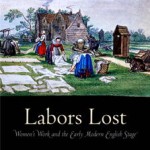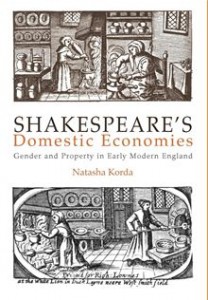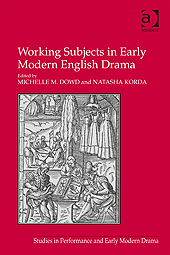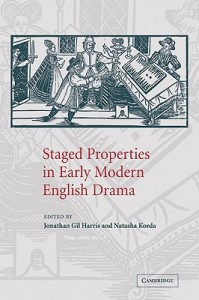Books
 Labors Lost: Women’s Work and the Early Modern English Stage (Philadelphia: University of Pennsylvania Press, 2011). 324 pp.
Labors Lost: Women’s Work and the Early Modern English Stage (Philadelphia: University of Pennsylvania Press, 2011). 324 pp.
Labors Lost offers a wide-ranging account of working women’s behind-the-scenes and hitherto unacknowledged contributions to theatrical production in Shakespeare’s time, revealing that the purportedly all-male professional stage relied on the labor, wares, ingenuity and capital of women of all stripes, including ordinary crafts- and tradeswomen who supplied costumes, properties and comestibles; wealthy heiresses and widows who provided much-needed capital and credit; wives, daughters and widows of theater people who worked actively alongside their male kin; and immigrant women who fueled the fashion-driven stage with a range of newfangled skills and commodities. Combining archival research on these and other women who worked in and around the playhouses with revisionist readings of canonical and lesser-known plays, it details the diverse ways in which women participated in the work of playing, and the ways in which male players and playwrights in turn helped to shape the cultural meanings of women’s work.
“Natasha Korda continues to produce some of the finest scholarship that weaves together the history and cultural representations of the economic lives of early modern Englishwomen. Her latest endeavor, in which she wields the methods and sources of history, literary criticism, art history, and archaeology with aplomb, will appeal to a wide-ranging audience. … For anyone interested in early modern theater, London, or women’s work this is a must-read.” — Renaissance Quarterly
“… an astonishing achievement … ” — Early Theatre
“Korda evidently relishes the abundance and variety of her subject, using economic and commercial history as a lively and even lyrical approach. … [Her] subtle readings show that women’s role in commercial theatre was not just an issue behind the scenes, but one which was regularly dramatized by (all-male) casts on stage.” — Times Literary Supplement
 Shakespeare’s Domestic Economies: Gender and Property in Early Modern England (Philadelphia: University of Pennsylvania Press, 2002). 276 pp.
Shakespeare’s Domestic Economies: Gender and Property in Early Modern England (Philadelphia: University of Pennsylvania Press, 2002). 276 pp.
Examines Shakespeare’s domestic drama in relation to early modern England’s nascent consumer culture and competing conceptions of property. As newly available market goods began to infiltrate households at every level of society in the early modern period, women emerged as never before as “keepers” of household goods. The housewife’s managerial function assumed a new form, becoming increasingly centered around caring for the objects of everyday life–objects she was charged with keeping as if the were her own, in spite of legal strictures governing women’s property rights.
“This book represents some of the most promising directions in contemporary Shakespeare criticism. It brings together historicist, materialist, Marxist, and feminist analysis; it is solidly grounded in historical research; and it is nuanced by subtle attention to the language of Shakespeare’s plays. Both Korda’s findings and her methodology provide exemplary models for future work.” — Shakespeare Quarterly
“Like the best of scholarship in the field, Korda’s goal is to offer much more than new readings of Shakespeare: she seeks to offer a new way of reading Shakespeare. Through her exploration of the entwined linguistic and domestic economies of early modern culture, Korda reanimates a lost history of the domestic … . In so doing, Korda achieves the best of what feminist scholarship can offer to our understanding of the past.” — Criticism
Anthologies
 Working Subjects in Early Modern English Drama, ed. Michelle Dowd and Natasha Korda (Burlington, VT: Ashgate Press, 2011). 314 pp.
Working Subjects in Early Modern English Drama, ed. Michelle Dowd and Natasha Korda (Burlington, VT: Ashgate Press, 2011). 314 pp.
Early modern England witnessed a series of remarkable economic changes that transformed the landscape of labor and the working subjects who populated it. The commercial theater, a cultural institution indebted to both traditional guild structures and the innovations of a burgeoning market economy, was uniquely positioned to interrogate the shifting boundaries of England’s labor economy and to explore the subject of work itself. Bringing into heightened visibility a newly diverse range of occupational roles–including the hitherto unknown occupation of the ‘professional player’–it provided a platform upon which the contours and legitimacy of these roles might be explored and their social implications played out. This essay collection sets out to investigate the ways in which work became a subject of inquiry on the early modern stage and the processes by which the drama began to forge new connections between labor and subjectivity.
“[An] excellent collection of essays … the scholars here assembled have seized on what is interesting and culturally revelatory in a refreshingly diverse array of texts.” –from the Afterword by Jean E. Howard
“This valuable anthology … makes three major interventions. One, in moving beyond citizen or city comedies, it considers labour in relation to diverse theatrical forms, including emerging ones such as tragicomedies and travel plays. Two, … it expands the focus to production and to diverse labouring subjects. Three, … the volume illuminates the intersection of local and global economic and cultural networks, a real need in the field.” — Renaissance Quarterly
 Staged Properties in Early Modern English Drama, ed. Jonathan Gil Harris and Natasha Korda (Cambridge: Cambridge University Press, 2002; paperback 2007). 347 pp.
Staged Properties in Early Modern English Drama, ed. Jonathan Gil Harris and Natasha Korda (Cambridge: Cambridge University Press, 2002; paperback 2007). 347 pp.
This collection of essays studies the material, economic and dramatic roles played by stage properties in early modern English drama, offering valuable evidence and insight into the modes of production, circulation and exchange that brought such properties as sacred garments, household furnishings, pawned objects and even false beards onto the stage. The volume reflects upon what the material history of stage props may tell us about the changing demographics, modes of production and consumption, and notions of property that contributed to the rise of the commercial theater in London.
“… an outstanding anthology which achieves a newly energizing convergence between cultural materialism and theater / performance history. The success of this volume lies in the fact that it addresses the dense and knotty philosophical problem of the nature of materiality in the very specific context of theater history.” — Studies in English Literature
“… splendid collection …” — Times Literary Supplement
“For anyone who thought the early modern actor stood in a ‘wooden O,’ this book is a must.” — Journal of New Theatre Quarterly
Essays
“Shakespeare’s Motists,” in Playing and Playgoing in Early Modern England: Actor, Audience and Performance, ed. Simon Smith and Emma Whipday (Cambridge: Cambridge University Press, 2022): 18-36.
“Epilogue | Field of Play: Gamifying Early Modern Theatre and Performance Studies,” in Games and Theatre in Shakespeare’s England, ed. Gina Bloom, Erika Lin, and Tom Bishop (Amsterdam: Amsterdam University Press, 2021), 303-16.
“Gyno Ludens: A Doll House Redux,” in Routledge Companion to Theatre and Performance Historiography, ed. Tracy Davis and Peter Marx (New York: Routledge, 2020), 65-85.
“Understanding Shakespeare’s Shoes,” in Shakespeare’s Things: Agency, Materiality, and Performance, ed. Brett Gamboa and Lawrence Switzky (New York and London: Routledge, 2020), 36-53.
“If the Shoe Fits, Or the Truth in Pinking,” in Transnational Connections in Early Modern Theatre, ed. M. A. Katritzky and Pavel Drábek (Manchester: Manchester University Press, 2020), 23-38.
“Much Ado About Ruffs: Laundry Time in Feminist Counter-Archives,” in Early Modern Histories of Time: The Periodizations of Sixteenth- and Seventeenth-Century England, ed. Kristen Poole and Owen Williams (Philadelphia: University of Pennsylvania Press in Cooperation with the Folger Shakespeare Library, 2019), 124-42.
“Gyno Ludens: Small Work and Play in Everyday Archives,” Forum on “Play, Games and Performance,” Early Modern Women Journal 12.1 (2017): 173-82.
“Women’s Involvement in Theatrical Production,” in A New Companion to Renaissance Drama, ed. Arthur F. Kinney and Thomas Warren Hopper (Chichester, West Sussex, UK: Wiley Blackwell, forthcoming 2017), 282-95.
“Shakespeare’s Laundry: Feminist Futures in the Archive,” in Rethinking Feminism: Gender, Race, and Sexuality in Early Modern Studies, ed. Ania Loomba and Melissa Sanchez (New York: Routledge, 2016), 93-112.
“‘In Praise of Clean Linen’: Laundering Humours on the Early Modern Stage” (co-authored with Eleanor Lowe), in The Routledge Handbook of Material Culture in Early Modern Europe, ed. David Gaimster, Tara Hamling and Catherine Richardson (New York: Routledge, 2015), 307-21.
“Afterword,” Special Issue on “Shakespeare and the Actress,” ed. Clare McManus and Lucy Munro, Shakespeare Bulletin 33:1 (2015): 121-28.
“How to Do Things with Shoes,” in Shakespeare and Costume, ed. Bella Mirabella and Patricia Lennox, The Arden Shakespeare (London: Arden / Methuen, 2015), 84-104.
“Afterword,” Special Issue on “Shakespeare and the Actress,” ed. Clare McManus and Lucy Munro, Shakespeare Bulletin 33:1 (2015): 121-28.
“Coverture and Its Discontents: Legal Fictions On and Off the Early Modern English Stage,” in Married Women and the Law in England and the Common Law World, ed. Tim Stretton and Krista Kesselring (McGill-Queen’s University Press, 2013), 45-63.
“The Sign of the Last: Gender, Material Culture and Artisanal Nostalgia in Dekker’s The Shoemaker’s Holiday,” Special Issue on “Medieval and Early Modern Artisan Culture,” ed. Margaret A. Pappano and Nicole R. Rice, The Journal of Medieval and Early Modern Studies 43:3 (2013): 573-97.
“Insubstantial Pageants: Women’s Work and the (Im)material Culture of the Early Modern Stage,” Special Issue on “Discoveries from Archaeology,” Shakespeare: Journal of the British Shakespeare Association 7:4 (2011): 413-31. Reprinted in European Theatre Performance Practice, 1580-1750, ed. Robert Henke and M.A. Katritzky (Burlington, VT: Ashgate: 2014).
“Accessorizing the Stage: Alien Women’s Work and the Fabric of Early Modern Material Culture,” in Ornamentalism: The Art of Renaissance Accessories, ed. Bella Mirabella (Ann Arbor: University of Michigan Press, 2011), 223-52.
“Trade, Work and Workers,” in Thomas Middleton in Context, ed. Suzanne Gossett (Cambridge: Cambridge University Press, 2011), 75-82.
“Introduction” (co-authored with Michelle Dowd), in Working Subjects in Early Modern English Drama, ed. Michelle Dowd and Natasha Korda (Burlington, VT: Ashgate, 2011), 1-16.
“Staging Alien Women’s Work in Civic Pageants,” in Working Subjects in Early Modern English Drama, ed. Michelle Dowd and Natasha Korda (Burlington, VT: Ashgate, 2011), 53-68.
“Sex, Starch-Houses and Poking-Sticks: Alien Women’s Work and the Technologies of Material Culture,” Special Forum on “Sex and the Early Modern Woman: Representation, Practice, and Culture” in Early Modern Women: An Interdisciplinary Journal 5 (2010): 201-8.
“Vicious Objects: Staging False Wares” in Masculinity and the Metropolis of Vice, 1550-1650, ed. Amanda Bailey and Roze Hentschell (New York and Houndmills, UK: Palgrave Macmillan, 2010), 161-84.
“Froes, Rebatos and Other ‘Outlandish Comodityes’: Weaving Alien Women’s Work into the Fabric of Early Modern Material Culture,” in Everyday Objects: Medieval and Early Modern Material Culture and its Meanings, ed. Tara Hamling and Catherine Richardson (Burlington, VT: Ashgate, 2010), 95-106.
“Dame Usury: Gender, Credit and (Ac)counting in the Sonnets and The Merchant of Venice,” Shakespeare Quarterly 60: 2 (2009): 129-53.
“Women and the Theater,” in Oxford Handbook on Early Modern Theatre, ed. Richard Dutton (Oxford: Oxford University Press, 2009), 456-73. (Volume awarded Elizabeth Dietz Memorial prize for best book in Early Modern Studies.)
“Gender at Work in the Cries of London,” in Oral Traditions and Gender in Early Modern Literary Texts, ed. Karen Bamford and Mary Ellen Lamb, Series on Women and Gender in the Early Modern World (Burlington, VT: Ashgate, 2008), 117-35.
“Women’s Informal Commerce and the ‘All-Male Stage,’” in The Impact of Feminism in English Renaissance Studies, ed. Dympna Callaghan (New York and Houndmills, UK: Palgrave Macmillan, 2007), 259-80.
“The Case of Moll Frith: Women’s Work and the ‘All-Male Stage,’” in Beyond the All-Male Stage: Women Players in Early Modern England, 1500-1660, ed. Peter A. Parolin and Pamela Allen Brown (Burlington, VT: Ashgate, 2005; paperback reprint 2008), 71-88.
“Labors Lost: Women’s Work and Early Modern Theatrical Commerce,” in From Script to Stage in Early Modern England, ed. Peter Holland and Stephen Orgel, Redefining British Theatre History Series, gen. ed. Peter Holland (New York and Houndmills, UK: Palgrave Macmillan, 2004), 195-230.
“The Case of Moll Frith: Women’s Work and the ‘All-Male Stage,’” in Early Modern Culture (an on-line journal; http://emc.eserver.org), Issue Four: Special Issue on “Materiality” (2004).
“The Merry Wives of Windsor: A Modern Perspective,” in William Shakespeare, The Merry Wives of Windsor, ed. Barbara A. Mowat and Paul Werstine, Folger Shakespeare Library Edition (New York: Washington Square Press, 2004), 227-40.
“Isabella’s Rule: Singlewomen and the Properties of Poverty in Measure for Measure,” in Women, Property and the Letters of the Law in Early Modern England, ed. Nancy E. Wright, Margaret W. Ferguson and A. R. Buck (Toronto: University of Toronto Press, 2004), 137-61.
“Singlewomen and the Properties of Poverty in Measure for Measure,” in Money and the Age of Shakespeare: Essays in the New Economic Criticism, ed. Linda Woodbridge (London and New York: Palgrave Macmillan, 2003), 237-250.
“Introduction: Towards a Materialist Account of Stage Properties” (co-authored with Jonathan Gil Harris), in Staged Properties in Early Modern English Drama, ed. Jonathan Gil Harris and Natasha Korda (Cambridge: Cambridge University Press, 2002), 1-34.
“Women’s Theatrical Properties,” in Staged Properties in Early Modern English Drama, ed. Jonathan Gil Harris and Natasha Korda (Cambridge: Cambridge University Press, 2002), 202-29.
“‘Judicious Oeillades’: Surveying Marital Property in The Merry Wives of Windsor,” in Marxist Shakespeares, ed. Jean E. Howard and Scott Cutler Shershow, Accents on Shakespeare Series (London and New York: Routledge, 2001), 82-103.
“‘Household Kates’: Domesticating Commodities in The Taming of the Shrew,” Shakespeare Quarterly 47:2 (Summer 1996): 109-31. Reprinted in The Taming of the Shrew, ed. Dympna Callaghan (New York and London: W. W. Norton & Co., 2009); The Taming of the Shrew: Critical Essays, ed. Dana E. Aspinall (London and New York: Routledge, 2002), 192-225; Much Ado About Nothing and The Taming of the Shrew, ed. Marion Wynne-Davies, New Casebooks Series (London and New York: Palgrave Macmillan, 2001).
“Household Property / Stage Property: Henslowe as Pawnbroker,” Theatre Journal 4 (Summer 1996): 185-95.
“Mistaken Identities: Castiglio(ne)’s Practical Joke,” in Desire in the Renaissance, ed. Regina Schwarz and Valeria Finucci (Princeton: Princeton University Press, 1994), 39-60.
Book Reviews
Review of Helen Smith, Grossly Material Things: Women and Book Production in Early Modern England (Oxford: Oxford University Press, 2012) in Journal of British Studies 53:1 (2014): 224-26.
Review of Jennifer Panek, Widows and Suitors in Early Modern English Comedy (Cambridge: Cambridge University Press, 2004) in Journal of British Studies 46:1 (2007): 167-69.
Review of Ann Rosalind Jones and Peter Stallybrass, Renaissance Clothing and the Materials of Memory (Cambridge: Cambridge University Press, 2000) in Shakespeare Quarterly 54:2 (Summer, 2003): 209-12.
Review of Viviana Comensoli, Household Business: Domestic Plays of Early Modern England (Toronto: University of Toronto Press, 1996) in Medieval and Renaissance Drama in England, Volume 12, ed. John Pitcher (Madison: Fairleigh Dickinson University Press and London: Associated University Presses, 1999), 345-350.
Review of William Shakespeare, The Taming of the Shrew: Texts and Contexts, ed. Frances E. Dolan (New York: Bedford Books of St. Martin’s Press, 1996) in Shakespeare Quarterly 49:3 (Fall 1998): 322-25.
Review of Frances E. Dolan, Dangerous Familiars: Representations of Domestic Crime in Early Modern England 1550-1700 (Ithaca: Cornell University Press, 1994) in MLN 109 (December 1994): 1000-1003.
Review of Susan Zimmerman ed., Erotic Politics: Desire on the Renaissance Stage (New York: Routledge, 1992) in MLN 108 (December 1993): 980-84.
Review of Sarah Kofman, The Childhood of Art: An Interpretation of Freud’s Aesthetics, trans. Winifred Woodhull (New York: Columbia University Press) in MLN 103 (December 1988): 1172-74.
Encyclopedia Entries
“Women’s Economic Status and Property Relations,” “Women and Theatrical Production,” and “Talkativeness and Tongues,” in The Stanford Global Shakespeare Encyclopedia, ed. Patricia Parker (Stanford, CA: Stanford University Press, forthcoming).

